For most people, the Philippines, Indonesia and Taiwan are great holiday destinations. But what’s it like to operate a moving business across these archipelagos, which span some 21,000 islands? Andrew Mourant finds out.
Any glance at a world atlas will show that FIDI Affiliates in the Far East – especially those in the archipelagos comprising Indonesia, the Philippines and Taiwan– have to work in a pretty challenging environment.
Indonesia: a nation of 13,400 islands; the Philippines: one of 7,600. ‘We have many challenges, usually around the lack of infrastructure,’ Elliot McMahon, AGS Four Winds – Philippines’ Manilla-based General Manager tells FIDI Focus. ‘However, inter-island shipping is actually very efficient and there’s always a solution, even in the most remote areas.’
Most of AGS’ business – 85 per cent – is in Manila and Cebu, the country’s two major cities. The key to working in far-flung rural areas is, says McMahon, a network of experienced and long-serving staff. ‘One, at least, will have made a delivery or done packing in places that even a Google search may struggle to find. I’m always impressed by how industrious the Filipinos are when needed.’
Alexandre Aubry, recently appointed Santa Fe Relocation General Manager for the Philippines, sees the lie of the land as an opportunity. ‘Congestion in Manilla has forced the country to develop the islands, creating new markets,’ he says. ‘We’ve also been based in Cebu, the most central island, for 10 years, and will continue to expand.’
Santa Fe covers the gamut of moving services – from international and domestic for corporate and private clients, to fine art. Despite upheavals in the global economy, that of the Philippines appears robust – current annual growth of GDP is running at more than six per cent.
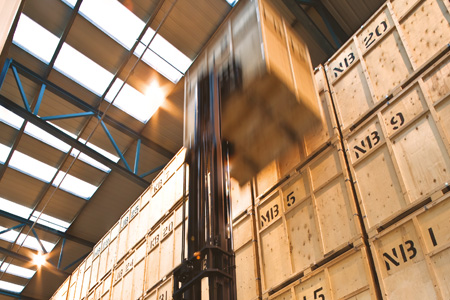
‘Our capacity to adapt to fast market changes will make us succeed,’ says Aubry. ‘Innovative management, high tech, a mix of enthusiastic and talented young staff with experienced and knowledgeable professionals are our assets. Rapid economic development brings new options for everyone.’
But it also brings out the low-cost wheeler dealers. ‘We have huge cost-cutting issues with local competition,’ says McMahon. ‘Price-conscious global relocation contracts have an effect on how we operate. However, locally, we’re comfortable competing in our comparable market. We can’t compete with a freight forwarder, but we don’t want to, as we aren’t offering the same product.’
In so complex and widely dispersed a country as Indonesia, a ‘solid footprint’ is essential, according to Asian Tigers’ country managing director Bill Lloyd, especially with the moving industry so badly bruised by a sharp decline in oil and gas investment.
‘Since the mass exodus in 2016 of oil and gas expats, we’ve had to change gear. We focus more on the domestic market for local and office moves, as well as logistics and distribution,’ Lloyd tells FIDI Focus. ‘The overall market has shrunk considerably.’
That solid footprint is strengthened beyond Asian Tigers’ offices by dependable partners. ‘They’re happy for our supervisors to be flown in to oversee things. Nothing is impossible in the archipelago with proper planning and hands-on management.’
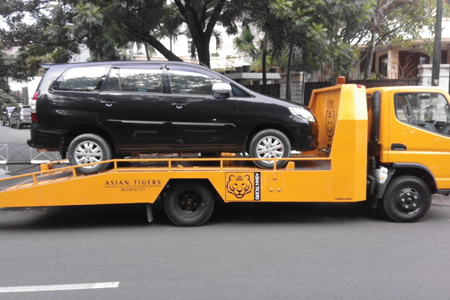
Those supervisors will be as well-drilled as any in the region. ‘We’re the only moving company in Indonesia that conducts its own packing school every few years,’ claims Lloyd. ‘But it also means we’ve ended up training most of our competitors’ packers – guys that don’t make the final Asian Tigers cut can go and get a job elsewhere.’
It remains, Lloyd says, a tough time for foreign investment in Indonesia. With office and domestic moving currently ‘the name of the game’ – there’s a growing Indonesian middle class and mass need for quality logistics – firms need to be nimble.
‘Because Asian Tigers isn’t a multinational or franchise, it enables us to evolve quicker and stay one step ahead of our competitors. Basically, if we see an opportunity or need for change, we create our plan and pull the trigger.’
The business picture is somewhat different for AGS Philippines. Its predominant focus is international shipping, with only a small percentage domestic – ‘usually corporate executives and expats moving locally while in their posting,’ says McMahon. But that trade has taken a hit for reasons familiar to FIDI Affiliates worldwide, such as fewer families moving overseas. ‘They’re being replaced with couples or singles travelling light,’ says McMahon. ‘Many companies are moving from full expat contracts to local contracts.’
Promoting local Filipino talent is, McMahon concedes, ‘excellent for the country’. ‘But the downside for our industry is the drop to just one or two expat specialists or top-tier positions that won’t be replaced. So we lose that natural turnover every two to four years.’
Nevertheless, he says, AGS manages to thrive. ‘There’s been natural growth in the market and we’ve enjoyed a good reputation locally – trust with clients and partners has been the main driver, and the work of our operations team is always commented on.
‘We face a hugely bureaucratic system in the Philippines that frustrates new arrivals who don’t understand the country. It’s important to manage expectations and explain things clearly from the start so all parties are on the same page and aren’t surprised by timelines and processes.’
Whatever the country, nothing beats industry experience when it comes to pulling off a tricky job. A few years ago, Lloyd went to survey the penthouse home of a banker planning his move from Jakarta to Japan. ‘It was like a porcelain museum with thousands of figurines,’ he recalls. ‘They were highly intricate with tiny fingers, some as thin as sewing needles.
‘There were no original boxes and so we had to carve foam bases for each figure and build custom boxes, using tiny foam pellets to fill around the figures. Packing took a month, but when we unpacked and delivered, every item was 100 per cent intact.’
Few companies are more adept at handling art and treasures than Taiwan-based Crown Van Lines. Among its more unusual jobs was moving a Chinese temple to Prague in the Czech Republic. ‘But the biggest challenge for our art department has been moving and packing the collections of Chi Mei Museum – antiques, bronze, silverware, marble and ceramics,’ CEO Jack Sun tells FIDI Focus.
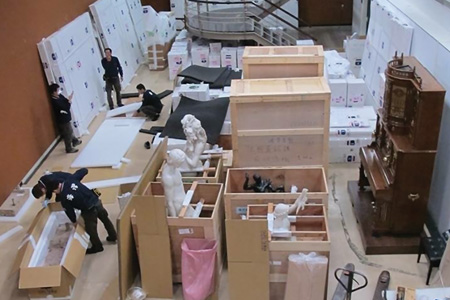
It meant transporting every artefact to a new purpose-built museum at Tainan City and installing the lot under the watchful eyes of curators. ‘We’ve been working on it for more than four years, and it will take a few more to complete the job.’
It’s a long-term assignment that many a mover would give their right arm for. ‘But these aren’t unexpected gifts from the sky,’ Sun points out. ‘We’ve been preparing for many years.’ For, overshadowing Taiwan, is its difficult relationship with mainland China. ‘In the 1990s, the moving business here went downhill quickly,’ Sun explains. ‘So we decided to invest more capital in Taiwan and developed other departments – record storage; commercial exhibitions; office and domestic.’
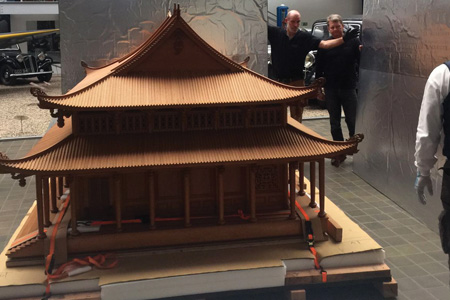
Above all, fine art exhibitions demand the highest packing standards. Crown Van Lines chose to invest in skills – ‘a direction quite different from others in recent years,’ says Sun. The trend for Taiwanese movers, Sun adds, has been to cut manpower or outsource operations, retaining only sales, marketing and move co-ordinator staff. ‘But we believe having on-site staff is the crux – after all, we’re not just a marketing broker or “image engineering” business.’
Preparation is everything – getting to grips with client requirements; planning the move; and monitoring. ‘Different customers have distinct demands. The attitude of our staff is the key – a willingness to solve issues.’
Vincent Ong, Director at Allied Pickfords Co.,Ltd, in Taipei City, explains: ‘The business has remained more or less that same as last year, as many international companies have been trying to localise their “management level”, so the volume of the international expats has shrunk a bit in recent years. We have been very focused on the services we provide to our clients from the office and onsite by our crew in order to get some referrals from those satisfied clients and their friends.’
New to the FIDI fold is Kellys Express, whose general manager MT Rajah has long cut a distinctive figure on Indonesia’s removals scene. His firm’s business ranges from household goods moving to embassy relocations. Since the oil and gas departures of 2015-2017, there has, says Rajah, been an upturn in other manufacturing industries, not least in some of Indonesia’s remoter regions.
A major part of Kellys Express trade comes from Japan: ‘We’ve handled about 90 per cent of Japanese expat relocations since 2010,’ he says. ‘That trade depends on loyalty and trust. Non-Japanese business is maintained by quality service, affordable price and good networking, where quick decisions can be made by thinking outside the box. A high volume of our business is generated by close networking and selling the brand name with a soft approach. The household goods moving business has changed in the last five to six years, with cost-conscious end users. The volumes are smaller. Newcomers mostly know of our services from their peers.’
Kellys Express’ head office is in Jakarta. It has partners in Bali, Surabaya, and some other provincial cities, as well as a presence in Indonesia’s main ports. Rajah says that service quality is maintained ‘by regular visits to and fro’. The company’s emerging markets are the ASEAN countries, Australia/New Zealand and, to a smaller degree, Europe, for retirees.
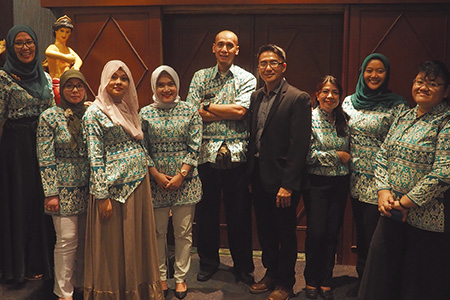
He’s looking forward to sharing the benefits of FIDI affiliation. ‘It’s very important, in the context of multinationals, for global contracts,’ he says. ‘Many mega corporations and foreign embassies told us to come back once we’d become a FIDI Affiliate. FIDI FAIM certification will undoubtedly lift our company to a higher level of trust.’
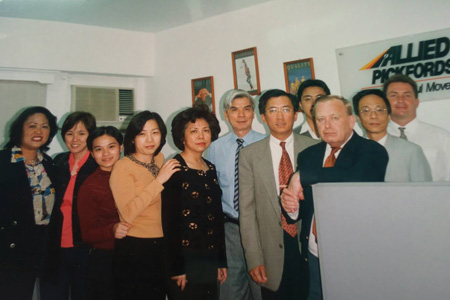
The company has already proved it can handle a variety of demanding one-off moves, whether shifting a 3.5 ton stone carved statue from Bali to Malaysia, or relocating a restaurant from Jakarta to Bali ‘lock, stock and barrel.’
In so disparate yet competitive a nation as Indonesia, Santa Fe Relocations’ country manager Doug Slusher is keen to use new technology alongside the ‘solid teams’ that allow his firm to uphold standards across the country’s remotest corners.
Santa Fe offers a ‘one-stop-shop’ for expat needs, which includes moving, assignment management, immigration and destination services. Business, Slusher says, has stabilised since 2017 as Indonesia shrugs off its oil and gas downturn. ‘Being FIDI certified plays a key role, as does our new interactive technology platform, CORE.’
This was rolled out in 2018. ‘Its purpose is for us to be able to operate today and grow tomorrow,’ says Slusher. It’s used to align the company’s ‘front end’ – website, client and assignee portals – with the back-end system. Phase two, which is due in 2019, will focus on supporting operational processes ‘while improving customer service’.
How does Slusher see the future for Indonesia? Very much in a positive light. There are, he believes, ‘an unlimited number of opportunities’ for foreign direct investment (FDI).
Back in the Philippines, Aubry thinks that the chief benefit of FIDI affiliation is ‘giving us visibility outside the company and helping find the right partner beyond our network’; while for McMahon, belonging ‘supports our credentials when it comes to the way we operate – which is important in challenging countries’.
FIDI’s benchmark, says Lloyd, allows Asian Tigers ‘to choose the cream of the crop’ when shipping outside its own network. ‘It’s important, as those partners represent our brand and quality.’ But, he warns, FIDI accreditation isn’t everything – in countries with ‘an endless list of accredited agents, some are miles ahead of others’.
‘Over the past four years, I’ve seen a real downturn in the quality of some competitors due to rates pressure and the requirements of cost cutting,’ he says. ‘Sometimes you have to let this process take its course, as partner agents choose to do business with competitors based on cheaper rates. The good news is that it’s almost always a matter of time before this works its way back full circle.’
Grounds for optimism then? ‘I am the eternal optimist!’ Lloyd declares. ‘I’m optimistic about the future of our industry as globalisation continues to expand. I believe that, for all the changes our industry has seen over the past 10 years, things are beginning to settle. If you’ve evolved, then more than likely you’re well-placed to be a market leader.’
Even though many moves are smaller these days, McMahon, too, is buoyed by the prospects of future economic expansion. ‘The Philippines is still finding its way, but the change I’ve seen in the last four years will make Manila and the country unrecognisable in the next 10. So I’m optimistic. The world has never been smaller, and globalisation is increasing. We need to adapt, but I believe that plenty of opportunities remain.’
FIDI AFFILIATES IN INDONESIA, TAIWAN AND THE PHILIPPINES
| ASIAN TIGERS MOBILITY | Jakarta | Affiliate |
| SANTA FE RELOCATION | Jakarta | Affiliate |
| ALLIED PICKFORDS CO., LTD | Taipei | Affiliate |
| ASIAN TIGERS MOBILITY | Taipei | Affiliate |
| CROWN VAN LINES | Taipei | Affiliate |
| AGS FOUR WINDS – PHILIPPINES | Manila | Affiliate |
| ASIAN TIGERS MOBILITY | Manila | Affiliate |
| SANTA FE RELOCATION – MANILA | Manila | Affiliate |

